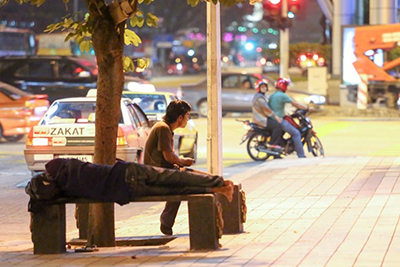
Picture: www.themalaymailonline.com
Waking up from a warm bed, a cool room, taking a shower, getting dressed, having a fulfilling breakfast, going to school, work or wherever we are supposed to. Then, coming back to a comfortable and conducive home, having dinner and heading to bed for much needed sleep and rest.
Imagine all the things that took place in your life yesterday, today and the coming days.
What I mentioned in the beginning are in fact basic needs, ones that unfortunately, many people today do not have. Most people would agree that a day like this is pretty much ordinary. Shelter, clothes, food, education, and family are among things that we usually take for granted and are things that every person deserves.
However, these things do not belong to everyone as surprisingly, many people in this country have no home. They own only the clothes that they wear. They do not know where their next meal will come from and many do not have family or friends to turn to for help. Quoting Mother Teresa, “We think sometimes that poverty is only being hungry, naked and homeless. The poverty of being unwanted, unloved and uncared for is the greatest poverty. We must start in our own homes to remedy this kind of poverty.”
The people I have been describing above are Kuala Lumpur’s homeless.
Recently, my friends and I were part of a programme that aimed to provide meals for the homeless. When we were told that the project was to be in Bukit Bintang/Pudu Raya, the first thing that came to our minds were, ‘are there homeless people there? It is one of Kuala Lumpur’s hotspots for people to socialize and shop. How on earth are we to find homeless people there?’
To our dismay, there were so many of them, from single people to families. It is safe to say that there were approximately 200 of them. This was a shocking figure, especially for me. It was a wake-up call, or should I say a reality check. I have been looking at life through rose-tinted glasses, unaware of the sufferings of the people in my own country when we are always focused on sending aid to foreign countries. I am a strong believer of helping those in need no matter who or where they are from, but this time, it struck me that we were spending so much time, energy and resources helping people in other countries. When on the other hand, there are so many right in front of our eyes that need as much help as we have been giving those overseas. I am in no way undermining the aid being sent overseas, I would just like to shed more light on the issues within our society that need our attention.
What does it mean to be homeless? Homeless is not just a category for the people living on the streets. To be homeless is to be a part of an ever growing culture. The homeless are a group of people that have different stories and backgrounds yet relate to each other because they know the struggle.
This project helped shed a positive light on what is known to be a negative lifestyle and advocate for those without a voice. It helped us to abandon the ideology that homeless people are lazy, good-for-nothing beggars that choose not to better themselves. As Wallace Stegner said, “Home is a notion that only nations of the homeless fully appreciate and only the uprooted comprehend.”
In my opinion, I think that the medical community can give back and help in various ways. One being to provide health care for those who are unable to reach out and ask for help. Students like me can in fact help by doing basic physical examinations and help create awareness in order for them to be able to try and live healthier lifestyles. It may not be much, but it will be our way of helping and contributing.
“There is a lot that happens around the world we cannot control. We cannot stop earthquakes, we cannot prevent droughts, and we cannot prevent all conflict, but when we know where the hungry, the homeless and the sick exist, then we can help.”
– Jan Schakowsky
Nurul Firdaus Binti Salahul Ahmed is a 3rd year medical student in Cyberjaya University College of Medical Sciences (CUCMS). Learn more about the Young Columnists under the Team page.
